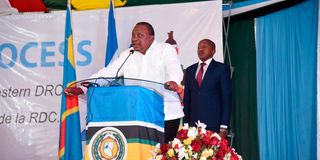Finding DRC truce critical and should be supported by all

Former President Uhuru Kenyatta speaking at Safaripark hotel in Nairobi on December 5, 2022 during the East African Community (EAC)- led Nairobi Process, the third peace talk on the eastern region of Democratic Republic of Congo (DRC).
Between November 29 and 30, 2022, at least 131 civilians in the Democratic Republic of Congo were killed in the villages of Kishishe and Bambo.
A statement released by the UN’s MONUSCO reported that the series of murders, rape, looting and kidnappings were as part of reprisals against the civilian population where 102 men, 17 women and 12 children were arbitrarily executed.
Report by authorities in Kinshasa stated that some 300 people, mostly civilians, died from attacks by M23. The militia group has denied the reports saying that only eight civilians died and it was as a result of stray bullets. The DRC government claimed there were 272 people killed in the Kishishe massacre.
A week later on December 6, 2022, the M23 political spokesman Lawrence Kanyuka signed an agreement to abide by the Luanda Accord to cease fire and withdraw from areas it illegally occupies in the Eastern DRC.
The M23 agreed that they are ready to start disengagement and withdrawal even if they were not represented at the Mini Summit of Heads of State held on November 23, 2022 in Luanda, Angola.
Dialogue
They also requested a meeting with the East African Regional Force and Ad-Hoc Verification Mechanism to discuss the implementation modalities. They reiterated their readiness to direct dialogue with the DRC government headed by President Tshisekedi in order to find a lasting solution to the root causes of the conflict in the DRC.
M23 are not the only existing militia in the DRC. They are however the most spoken about due to their alleged connection to Rwandan President Paul Kagame. Internationally, Rwanda has been called out multiple times and asked to refrain from aiding the M23. President Kagame has always denied these accusations and is publicly involved in the DRC peace process.
The recently concluded Inter-Congolese peace talks in Nairobi seem to have provided a ray of hope for DRC. So much so that the Former President of Kenya Uhuru Kenyatta said that the next phase of the talks would be held in Goma and Bunia in the DRC in 2023. Uhuru Kenyatta is leading the peace talks as the appointed EAC facilitator.
Article 6 of the treaty establishing the EAC outlines the fundamental principles that govern the achievement of the objectives of the community to include political will, peaceful co-existence and peaceful settlement of disputes.
Uhuru Kenyatta seems to be in his element as he leads these talks. He has often called for cooperation for mutual benefit within the East African communities. Should everything hold as is, this will be one of Uhuru Kenyatta’s major accomplishments.
Luanda summit
The terms and timelines agreed upon in the Luanda summit came off as a political decision with no real on-ground insight. M23 was not even represented in the summit nor did they sign any deal which would explain the recent massacre. The need for the militia to flex and have their power felt with no regard for the collateral damage is unsettling.
The follow-up meetings in Nairobi have proved to make strides in that they had their representation. The platform for their grievances to be heard was provided. This might in the end prevent any further escalation.
The East African Community Regional Force (EACRF) is still in Congo and its mission still stands. Their joint operations with the DRC force (FARDC) are still ongoing in line with their mandate.
There has been a general lack of transparency and accountability since the beginning of the DRC crisis. The refugee crisis is out of control as people escape from war-torn regions.
Social justice is none existent and it will take a long time after the war is over to pick up all the necessary pieces to have some semblance of a functional country. There is a long way to go for Congo. They need all the help they can get from the East African Community. These first steps are critical in creating a new path for the country.





